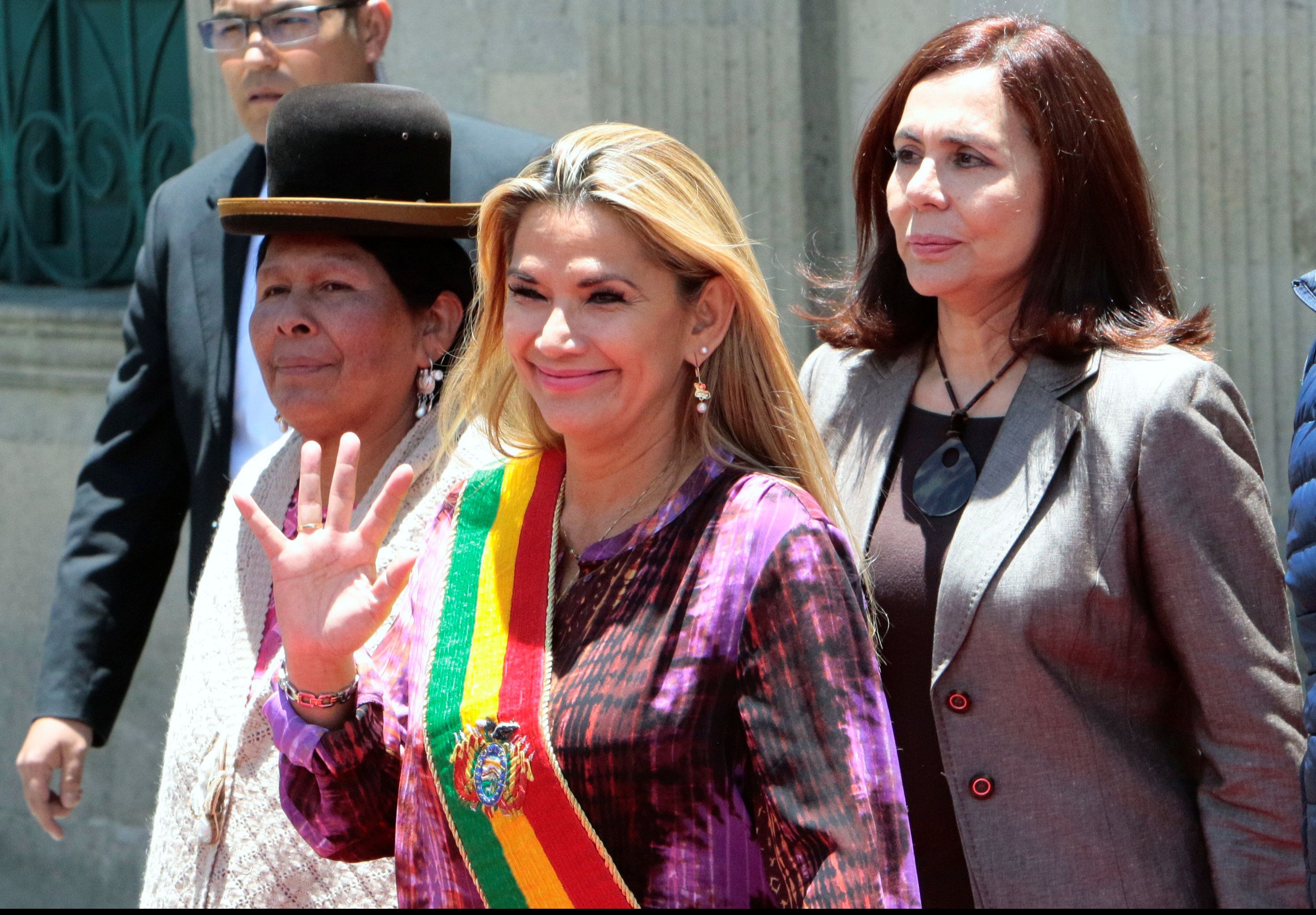November 19, 2019
Bolivia's polarizing interim president: After Bolivian president Evo Morales and his deputies were pushed out of office for rigging last month's presidential election, little-known opposition Senator Jeanine Añez took office as interim leader. Añez has promised to guide the country toward a "national consensus" ahead of new elections in January, but she's already risked deepening political divides. On day one, she lugged a giant bible into office, in a perceived swipe at Morales, who had elevated popular indigenous traditions that the ultra-conservative Ms. Añez once called "satanic." She's also abruptly reoriented the country's foreign ties toward Latin America's conservative governments. On her watch, at least eight pro-Morales protesters have been killed by the authorities. Morales himself, exiled in Mexico, says he's the victim of a coup and wants to run in the elections. Añez says he's barred, but his MAS political party still controls both houses of congress and has to be a partner for any smooth transition. Some compromise is necessary, but things don't seem to be going that way.
Impeachment and 2020 Democratic primaries: As the Trump impeachment process grinds on, a potential problem is emerging for some Democratic presidential candidates. If the House impeaches President Trump, there will be a trial in the Senate. If that trial is held in January/February, it will force Democratic senators to be in Washington rather than on the campaign trail engaging voters directly. That's potential bad news for presidential-hopeful Senators Elizabeth Warren, Bernie Sanders, Kamala Harris, Amy Klobuchar, and Cory Booker—and might be good news for rival candidates Joe Biden and Pete Buttigieg, who won't be chained to Washington. But do Republicans really want to help Biden beat Warren and Sanders, both of whom might be easier for Trump to beat? We'll be watching to see how Democrats in the House and Senate try to manage this problem.
US walks out on South Korea: Talks on the cost of basing US troops in South Korea ended abruptly Tuesday when the Americans walked out of the meeting, accusing Seoul of falling short of "fair and equitable burden sharing." Washington had demanded a five-fold yearly increase (to $5 billion) in Seoul's contribution to maintaining 28,500 American troops on the Korean peninsula. Earlier this year, Seoul agreed to pay $890 million, more than 40 percent of the day-to-day expenses of keeping US troops in the area. It also paid more than 90 percent of the hefty cost of relocating the US' main Korean base, and buys billions of dollars worth of US arms. Until now, US presidents have seen Washington's security commitments to Seoul — which date back to the 1950s when the Korean War ended without a peace treaty — as mutually beneficial: South Korea gets protection from the North, while the US gets to safeguard its security and economic interests in East Asia. Will President Trump's hardline approach to South Korea work? And will it set an enduring precedent? We're watching because similar talks on cost-sharing with Japan, Germany, and NATO are slated for next year.
What We're Ignoring
Dog days in Turkmenistan: Gurbanguly Berdymukhamedov, the eccentric autocrat who runs the gas-rich Central Asian nation of Turkmenistan, has long adored his country's renowned horse breeds (even when he's falling off of them.) But now he is pivoting to a different point on the mammalian map: dog. In particular, the Alabai, a hardy little sheepdog that has been part of Turkmenistan's traditionally nomadic society for thousands of years. Recently, he's been writing books and poems about the dogs, and now he plans to build a 50-foot tall statue of one in the capital as a symbol of national unity. We are ignoring this because we're spoiled by the last Turkmen president's penchant for building 25-story gold plated statues of himself that rotated to face the sun. Next to that, this pup stuff doesn't stack up.
More For You
America’s new National Security Strategy confirms what Europeans have feared for months: Washington now sees a strong, unified European Union as a problem to be solved, not an ally to be supported.
Most Popular
Sponsored posts
The power of sports
What's Good Wednesdays
What’s Good Wednesdays™, December 10, 2025
Walmart sponsored posts
Walmart's $350 billion commitment to American jobs
In this episode of Tools and Weapons, Microsoft Vice Chair and President Brad Smith sits down with Ed Policy, President and CEO of the Green Bay Packers, to discuss how purpose-driven leadership and innovation are shaping the future of one of the world’s most iconic sports franchises. Ed shares how technology and community-focused initiatives, from Titletown Tech to health and safety innovations on the field, are transforming not just the game of football, but the economy and culture of Green Bay itself. He explains how combining strategic vision with investment in local startups is keeping talent in the Midwest and creating opportunities that extend far beyond Lambeau Field.
Subscribe and find new episodes monthly, wherever you listen to podcasts.
Members of security forces stand guard outside a polliong station, a week late in a special election, after the local governing party kept voting closed on election day, amid accusations of sabotage and fraud, in a presidential race still too close to call as counting continues, in San Antonio de Flores, Honduras, December 7, 2025.
REUTERS/Leonel Estrada
More than a week after Hondurans cast their ballots in a presidential election, the country is still stuck in a potentially-dangerous post-election fog.
© 2025 GZERO Media. All Rights Reserved | A Eurasia Group media company.
